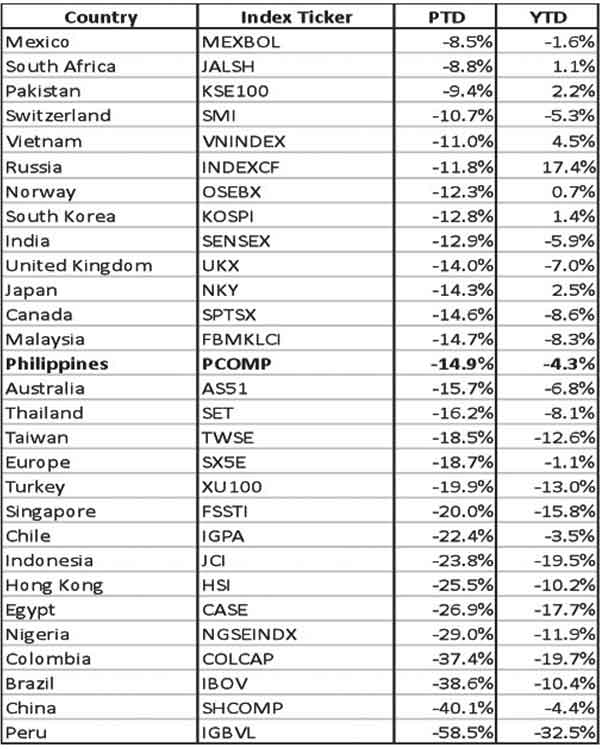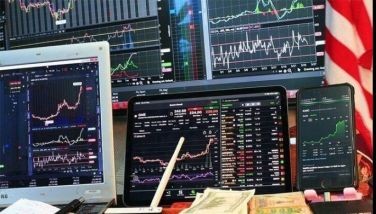Throwing the baby out with the bath water
Some of our readers are wondering why the peso and the PSE Index have gone down when our economy benefits from low oil and commodity prices. Our economy is mainly driven by domestic consumption and should, therefore, be the least affected by global weakness. However, as we are seeing now, our economy, currency and stock market are not totally immune from the global economic slowdown.
Global growth downgrades
The global slowdown becomes more apparent when we see downgrades of GDP growth estimates for the global economy. In June, the World Bank downgraded its forecast for 2015 global growth to 2.8 percent from three percent. In July, the International Monetary Fund (IMF) also lowered its 2015 global growth forecast to 3.3 percent from 3.5 percent.
China’s growth downgraded below seven percent
The Asian Development Bank (ADB) recently reduced its 2015 growth estimate for China to 6.8 percent from 7.2 percent previously. Moreover, Goldman Sachs downgraded its 2015 growth forecast for China to 6.4 percent from 6.7 percent. A slowdown in China greatly affects many emerging market countries.
Philippine GDP growth also downgraded
While the Philippine economy is expected to perform strongly amidst a slowing global economy, it has not been immune from the spate of GDP growth downgrades the world has experienced. Recently, Standard & Poor’s (S&P) reduced its 2015 growth forecast for the Philippines to 5.6 percent from an earlier projection of six percent. Moody’s Investor Service (Moody’s) likewise scaled down its 2015 growth forecast for the Philippines to 5.7 percent from its previous target of six percent. Moreover, there are several multinational banks that downgraded their growth estimates for our country. These downgrades reflect the view the Philippine economy will inevitably be affected by the global slowdown, even if it is expected to fare better than its peers.
Philippine peso, one of the best performing currencies
Since the US already ended its quantitative easing (QE) program and is contemplating a rate hike, the US dollar has performed strongly against most currencies. This is exacerbated by the global slowdown, which has resulted in the sharp depreciation of the currencies of the most affected countries. In the table below, we show the performance of various currencies vs. the US dollar from their post-2008 peak up to Sept. 25 (peak-to-date or PTD), as well as their year-to-date performance (YTD).
Table 1 – Performance of global currencies

Sources: Bloomberg, Investing.com, Wealth Research
Those who have been concerned about the slide of the peso might be surprised with this table. In the table above, we show the peso is actually among the strongest currencies in the world. The peso is one of the currencies which depreciated the least from its recent peak. The drop of the peso is really the result of the surging US dollar (see Chapter 7 of our book, Opportunity of a Lifetime).
PSE Index, middle of the pack
In the table below, we show how the PSE Index and other global stock indices have performed. While the peso has been one of the strongest currencies in the world, the PSE Index is in the middle of the pack compared to its peers in terms of PTD. Also, as seen in the table below, the YTD loss of the PSE Index is less severe than many of the other countries.
Table 2 – Performance of global stock indices

Sources: Bloomberg, Investing.com, Wealth Research
Philippine exposure in emerging market ETFs
Economically, the Philippines is categorized as an emerging country and is part of emerging markets (EM). Geographically, it is a part of Asia, where several EM countries are also located. Philippine stocks are, thus, included in many ETFs that invest in EM countries. Thus, when these ETFs are sold down, Philippine stocks are inevitably sold down as well. Based on data we have gathered, there are 84 documented ETFs that hold exposure to Philippine stocks, with total holdings amounting to $2.1b. In the table below, we show the top 10 ETFs in terms of amount of exposure to Philippine equities.
Table 3 – ETFs with the biggest exposure to Philippine stocks
Amounts in million dollars

Sources: etf.com, etfdb.com
The Baby and the bath water
The table above answers the question as to why the Philippine peso and stock market are dropping despite our country’s superior fundamentals. When global, EM or Asian ETFs are sold down, they are mandated to automatically reduce their Philippine equity exposure. Consequently, Philippine stocks are also sold down. As the title of our article suggests, this is a case when something good is indiscriminately thrown away with the bad things it is associated with. The slowdown in China has caused the recent meltdown in EM stocks and currencies and has, therefore, dragged the performance of the peso and the PSE Index (Best House in a Sliding Neighborhood, Sept. 14). Nonetheless, we continue to see the Philippines as the ‘best house in a bad neighborhood’, and there and some that share this view. Last week, HSBC came out with a report, describing the Philippine economy as “a bright star in a dim sky.”
Differentiated but not de-coupled
Since our country is not a commodity producer and is not heavily dependent on exports, we should be less affected by the various threats to global growth. However, the peso and the Philippine stock market were inevitably dragged down by the poor performance of our peers. Though our country is different and our economy is much stronger than our neighbors, our currency and stock market cannot go against the tide of turbulence that we are now witnessing. As such, we continue to look for signs that our market is de-coupling as we wait for things to stabilize on the global front and for the indiscriminate selling to abate.
Philequity Management is the fund manager of the leading mutual funds in the Philippines. Visit www.philequity.net to learn more about Philequity’s managed funds or to view previous articles. For inquiries or to send feedback, please call (02) 689-8080 or email [email protected].
- Latest
- Trending


























